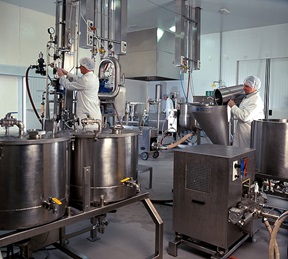In a previous article, we wondered if the world will continue to produce food in sufficient quantities. What would prevent that? Population growth, increasing meat consumption, climate change, water scarcity and a diminishing agricultural workforce. But an article in Nature sheds a completely new light on this problem. We should no longer grow food, but produce it industrially: food without agriculture.

We need to produce food
Food production has many unfavourable side effects. Like production of greenhouse gas CO2; agriculture is estimated to contribute 10% to total human production. In addition to that, agriculture uses water, pollutes air and water, often uses low-paid labour, clears forests, and harms biodiversity and natural carbon sinks. On the other hand, we need to produce enough food for mankind, and the number of people on this planet is still growing.
But the authors of the article highlight a completely different way of food production: through chemical synthesis. They concentrate on the food ingredient that can be best produced in this way, fat. They find that dietary fats can be produced at half the energy input required for agricultural fats. And with much less use of land and water, so with a much smaller environmental footprint. Even though they admit that a lack of consumer acceptance may stand in the way of realization of this pathway.
Food without agriculture
The opportunity of industrially produced food comes on top of plant-, cell- and fungi-based proteins and meat substitutes. Industrially produced fat makes use of feedstocks that are not the product of agricultural photosynthesis. So, how does this food without agriculture compare to food grown on the land?
The authors look into a number of pathways. Like starting from syngas (a mixture of H2 and CO, produced from fossil fuels); or from ethylene (C2H4), now produced in large quantities from fossil fuels and organic wastes. These feedstocks can be converted to paraffins, fatty acids and fats; or even to amino acids and then to proteins; or to methanol and then to carbohydrates. Among these syntheses, the production of fats is the most straightforward. Particularly because their chemistry is simple; and because chirality (resulting from asymmetrical carbon atoms) doesn’t play a role here. The production of fats will also compare favourable to ‘natural’ pathways, such as from soy and palm, because the latter crops have major environmental footprints.
A comparison
Nevertheless, synthetic fat production doesn’t always compare favourably to conventional fat production. Regional differences play a role, like yields and farming practices. In the future, if we should use only renewable energy, the case for synthetic production would be much clearer. And of course, synthetic fats score much better on land use.
But then, would synthetic fats be cheaper than traditionally produced fats? Here, the authors are very cautious. The estimate that ‘prices for high-purity synthetic fats may never be lower than the prices of the cheapest agricultural oils.’ Even though food produced in this way might carry advantages, for instance in purity. And there is no guarantee that the public will embrace the synthetic version. Also, the advent of synthetic foods would put many agricultural workers put of work. But then, industrialized nations have gone through a comparable process and managed it. And would people accept synthetically produced food? We don’t know.
Easing the environmental burden
Agriculture as it is now, uses a large share of the Earth’s resources, particularly land and water. Food without agriculture would ease this environmental burden. It would also give us the opportunity to reconcile protection of natural ecosystems with human food security.
On the other hand, will industrially produced fats be as healthy as natural fats? The latter show a natural variety, whereas synthetic products tend to be pure and non-varied. Our guess is that natural variations have favourable effects. And would mankind be able to build a food industry quickly enough to make up for the loss of agricultural production? What about other food ingredients than fat? Industrially produced food: it looks more like a dream than like an opportunity. We might better concentrate on raising agricultural productivity, more efficiently using its inputs. That might also ease the tension between biodiversity and agricultural production.
Interesting? Then also read:
Meat is fine! No problem for world food supply, says Rudy Rabbinge
Perspectives for agriculture – the new farming
Organic is not a good hallmark of quality – this is why
